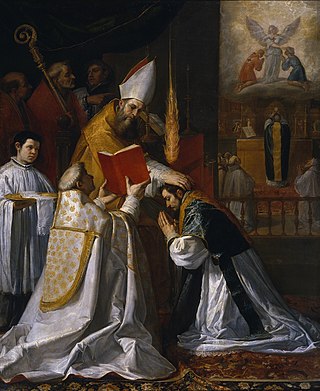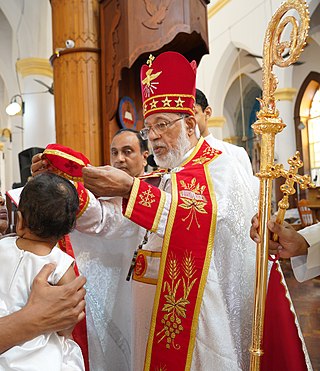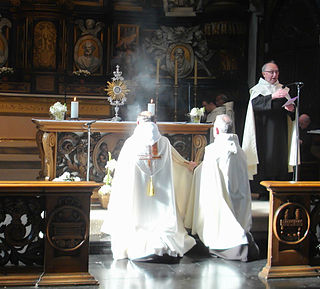
Anointing of the sick, known also by other names such as unction, is a form of religious anointing or "unction" for the benefit of a sick person. It is practiced by many Christian churches and denominations.

The Eucharist, also known as Holy Communion and the Lord's Supper, is a Christian rite that is considered a sacrament in most churches, and as an ordinance in others. According to the New Testament, the rite was instituted by Jesus Christ during the Last Supper; giving his disciples bread and wine during a Passover meal, he commanded them to "do this in memory of me" while referring to the bread as "my body" and the cup of wine as "the blood of my covenant, which is poured out for many".

In certain Christian denominations, holy orders are the ordained ministries of bishop, priest (presbyter), and deacon, and the sacrament or rite by which candidates are ordained to those orders. Churches recognizing these orders include the Catholic Church, the Eastern Orthodox, Oriental Orthodox, Anglican, Assyrian, Old Catholic, Independent Catholic and some Lutheran churches. Except for Lutherans and some Anglicans, these churches regard ordination as a sacrament.

The last rites, also known as the Commendation of the Dying, are the last prayers and ministrations given to an individual of Christian faith, when possible, shortly before death. They may be administered to those awaiting execution, mortally injured, or terminally ill. Last rites cannot be performed on someone who has already died. Last rites, in sacramental Christianity, can refer to multiple sacraments administered concurrently in anticipation of an individual's passing.

Transubstantiation is, according to the teaching of the Catholic Church, "the change of the whole substance of bread into the substance of the Body of Christ and of the whole substance of wine into the substance of the Blood of Christ". This change is brought about in the eucharistic prayer through the efficacy of the word of Christ and by the action of the Holy Spirit. However, "the outward characteristics of bread and wine, that is the 'eucharistic species', remain unaltered". In this teaching, the notions of "substance" and "transubstantiation" are not linked with any particular theory of metaphysics.
Orientalium Ecclesiarum, subtitled the Decree on the Eastern Catholic Churches is one of the Second Vatican Council's 16 magisterial documents. "Orientalium Ecclesiarum" is Latin for "of the Eastern Churches," and is taken from the first line of the decree.

Chrismation consists of the sacrament or mystery in the Eastern Orthodox, Oriental Orthodox and Eastern Catholic churches, as well as in the Assyrian Church of the East initiation rites. The sacrament is more commonly known in the West as confirmation, although Italian normally uses the term cresima ("chrismation") rather than confermazione ("confirmation").
Full communion is a communion or relationship of full agreement among different Christian denominations or Christian individuals that share certain essential principles of Christian theology. Views vary among denominations on exactly what constitutes full communion, but typically when two or more denominations are in full communion it enables services and celebrations, such as the Eucharist, to be shared among congregants or clergy of any of them with the full approval of each.

In Christian denominations that practice infant baptism, confirmation is seen as the sealing of the covenant created in baptism. Those being confirmed are known as confirmands. For adults, it is an affirmation of belief. It involves laying on of hands.

Closed communion is the practice of restricting the serving of the elements of Holy Communion to those who are members in good standing of a particular church, denomination, sect, or congregation. Though the meaning of the term varies slightly in different Christian theological traditions, it generally means that a church or denomination limits participation either to members of their own church, members of their own denomination, or members of some specific class. This restriction is based on various parameters, one of which is baptism. See also intercommunion.

Genuflection or genuflexion is the act of bending a knee to the ground, as distinguished from kneeling which more strictly involves both knees. From early times, it has been a gesture of deep respect for a superior. Today, the gesture is common in the Christian religious practices of the Anglican Church, Lutheran Church, Catholic Church, and Western Rite Orthodox Church. The Latin word genuflectio, from which the English word is derived, originally meant kneeling with both knees rather than the rapid dropping to one knee and immediately rising that became customary in Western Europe in the Middle Ages. It is often referred to as "going down on one knee" or "bowing the knee". In Western culture, one genuflects on the left knee to a human dignitary, whether ecclesiastical or civil, while, in Christian churches and chapels, one genuflects on the right knee when the Sacrament is not exposed but in a tabernacle or veiled.
Absolution is a theological term for the forgiveness imparted by ordained Christian priests and experienced by Christian penitents. It is a universal feature of the historic churches of Christendom, although the theology and the practice of absolution vary between denominations.

The Words of Institution are words echoing those of Jesus himself at his Last Supper that, when consecrating bread and wine, Christian Eucharistic liturgies include in a narrative of that event. Eucharistic scholars sometimes refer to them simply as the verba.

Eucharistic discipline is the term applied to the regulations and practices associated with an individual preparing for the reception of the Eucharist. Different Christian traditions require varying degrees of preparation, which may include a period of fasting, prayer, repentance, and confession.

Benediction of the Blessed Sacrament, also called Benediction with the Blessed Sacrament or the Rite of Eucharistic Exposition and Benediction, is a devotional ceremony, celebrated especially in the Roman Catholic Church, but also in some other Christian traditions such as Anglo-Catholicism, whereby a bishop, priest, or a deacon blesses the congregation with the Eucharist at the end of a period of adoration.

Catholicity is a concept pertaining to beliefs and practices that are widely accepted by numerous Christian denominations, most notably by those Christian denominations that describe themselves as catholic in accordance with the Four Marks of the Church, as expressed in the Nicene Creed formulated at the First Council of Constantinople in 381: "[I believe] in one, holy, catholic, and apostolic Church."
A sacrament is a Christian rite, including:
The Sacrament of Penance is one of the seven sacraments of the Catholic Church, in which the faithful are absolved from sins committed after baptism and reconciled with the Christian community. During reconciliation mortal sins must be confessed and venial sins may be confessed for devotional reasons. According to the dogma and unchanging practice of the church, only those ordained as priests may grant absolution.

The sacrament of holy orders in the Catholic Church includes three orders: bishops, priests, and deacons, in decreasing order of rank, collectively comprising the clergy. In the phrase "holy orders", the word "holy" means "set apart for a sacred purpose". The word "order" designates an established civil body or corporation with a hierarchy, and ordination means legal incorporation into an order. In context, therefore, a group with a hierarchical structure that is set apart for ministry in the Church.

A sacrament is a Christian rite that is recognized as being particularly important and significant. There are various views on the existence, number and meaning of such rites. Many Christians consider the sacraments to be a visible symbol of the reality of God, as well as a channel for God's grace. Many denominations, including the Catholic, Lutheran, Anglican, Methodist, and Reformed, hold to the definition of sacrament formulated by Augustine of Hippo: an outward sign of an inward grace, that has been instituted by Jesus Christ. Sacraments signify God's grace in a way that is outwardly observable to the participant.










